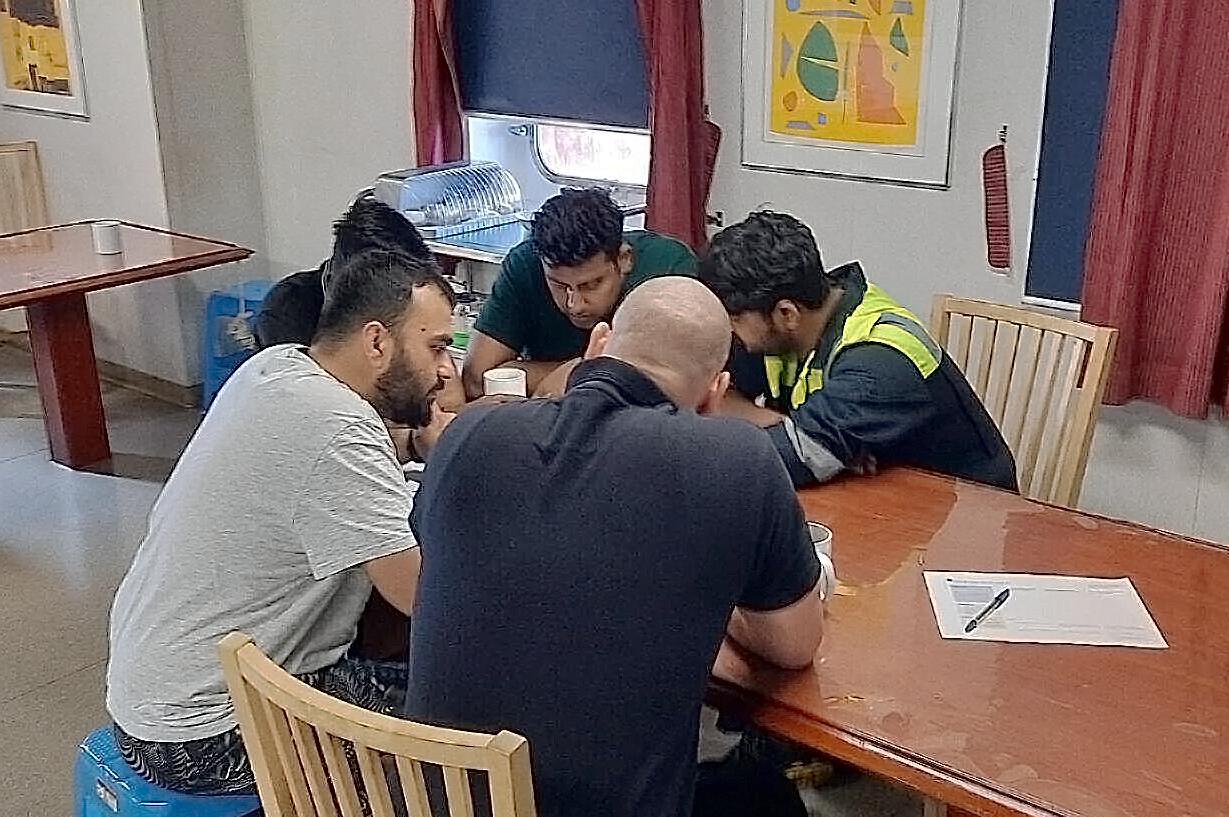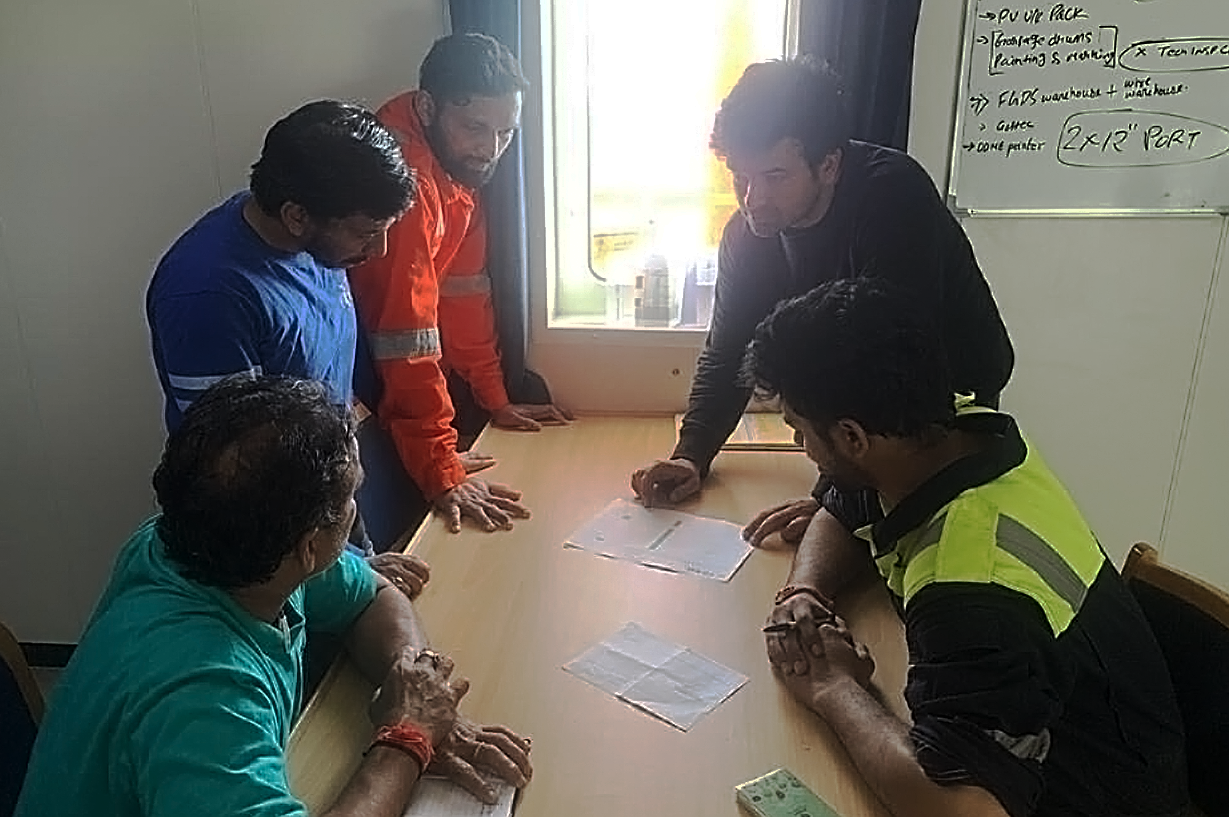When junior officers participate in leadership training they play a vital part in the strategies in TORM. With leadership skills in place at an early stage and knowing how to use the OneTORM supporting tools they contribute to strengthening the embedment of the OneTORM Safety Culture programme.
Empowerment and decision-making on board
In the maritime industry, many on-board leaders are used to receiving instructions and directions from the shore-based staff. Besides, they often have tons of procedures they are expected to know and follow. One could claim that they are merely considered managers rather than leaders.
TORM has recognised this and has been steps ahead in improving this culture.
Allan Dan Jensen, Head of Marine HR at TORM, describes TORM’s strategy:
“Our overall strategy is that we want to empower people and push the decision-making responsibility out on board. We think that is where it belongs so that we don’t ‘just’ have operators there. It is a strategic choice from our side. Other companies choose to have operators on board that are ‘controlled’ from shore by telling them what to do – a resource-heavy way of doing it.”
Value-based leadership on all levels
TORM has established its value-based leadership philosophy saying that the leaders are to draw their own conclusions and decisions based on the values established by the company, as these are the basis for direction and motivation.
TORM has always been steadfast in making everyone in the organisation fully and clearly understand, work towards, and live by the TORM Leadership Philosophy, the TORM Safety Standards, and other guiding processes as well as documents, which are collectively featured under the One TORM Safety Culture.
As part of this close collaboration with TORM in achieving this endeavour, Green-Jakobsen designed and started facilitating a safety leadership course in 2017. Since then, more than 600 senior officers and key shore staff have participated in it.
TORM has taken the next step: culture change is a continuous undertaking
The leadership course has initially been given to the on-board and shore-based leaders, a need that was identified during the implementation of the One TORM Safety Culture programme. But TORM also wants to have a ‘bottom-up’ approach and has pushed through with another leadership course; this time, it is for all their junior officers.
Allan Dan Jensen explains: “That was the first step in the roll-out of the project. The next step was to take a bottom-up approach which means that juniors can push upwards and ensure a broader knowledge about our One TORM safety programme. Our overall strategy is that all our juniors will become seniors and we want to show them a structured way forward”.
The course has yielded initial improvements in their culture through the juniors—and is expected to bring in many lasting improvements to the company:
The course supports TORM’s top priority—embedding TORM’s leadership philosophy and safety standards along with other existing safety tools (e.g., Safety Delta) and guidelines among everyone in the organisation.
“It is a very essential thing in the course is that the TORM Safety Standard seriously comes into play because the participants have to be acquainted with it in order to carry out the course activities. The course also helps us in communicating the value of our standard,” says Allan Dan Jensen.
Junior Officer Mathias Pedersen adds: “The tools, you cannot get them repeated enough because it is all about safety and the way you do the job.”.
TORM also aims at developing and honing juniors’ skills that enable them to be more reflective, adaptive, and innovative as well as highly participative in decision-making at work.
Allan Dan Jensen explains:
“We see from the talks with our juniors that they are reflecting on how they can challenge the senior officers and take a leadership role even if they come from different backgrounds and styles of education. And we did achieve that reflection as the Junior Officers can confidently say, ‘Okay, I am able to do this in my present position’ and they also have realised that they have a role to play in leading something and someone on board, especially in relation to safety.
We don’t know how the ships will function in 8-10 years, so the best competencies we can provide Junior Officers with are adaptability and innovation. The culture we wish to build is also decisive.”

Allan Dan Jensen describes the challenge with old habits and traditional career advancement systems.
“I think we all know the tendency to promote people on the basis of the achievements gained in the present function. Then, when they are promoted, the challenge for all organisations is that their gap analyses will reveal that they must try to catch up with what they have failed to develop before. We would like to make sure that people are ready before they are promoted. And even though we think everyone is responsible for their own career, we should guide them to go in the right direction with a more efficient and structured way forward. We should ensure that when they reach the next level, they have the necessary competencies. And basically, we should give them the tools even before they need them so they can start practising.”
Junior Officer Mathias Pedersen is taking advantage of the course: “The overall value of receiving this kind of course at this stage of my career is that I find it really relevant because I see it as part of my promotion”
There are also challenges: “We still hear examples of big power distance and strong hierarchical approach on board. It is also a challenge in this industry that many senior officers are afraid of delegating responsibility”, Allan Dan Jensen says.
But the course has given senior officers confidence in delegating more leadership responsibility to junior officers and the juniors now hold some of the tools that can put appropriate pressure on the seniors to do so.
Junior Officer Franko Separovic has tried different approaches, “At first, we participated in the (Safety Delta) dialogue with the captain and senior officers. And the second time, we were only junior officers with all the other crew, and then we tried to encourage everybody to speak up and discuss the things from the Safety Delta report, which we think could be improved. And everybody was participating, and they were telling exactly what the main problem is, what should be improved and, what should be done better.”

“No doubt, the seniors can be great mentors. They just need some extra push to fulfil such a role. We can also help seniors in that role by giving the juniors the capacities via the course—the juniors already have the knowledge when they get on board and don’t need so much coaching.” Allan Dan Jensen adds.
Junior Officer Mahesh Bararwa has some good experiences with his seniors, “I got support from my seniors whenever I had a doubt. For example, when I’m carrying out a risk assessment and I am not sure about something, I go and ask the Senior Officers.”
And through the course he has already experienced his leadership role:
“We were also learning a practical approach to leading the Safety Delta process. I had to plan and carry out the dialogue part and make arrangements for it.
When we talk about risk assessment planning and job debriefing, whenever carrying out the toolbox talk, the discussions and so on, I was doing that job. When I prepared the risk assessment, I gathered everybody involved, we discussed the risk assessment with them, and then we asked about their feedback, and their opinions. We interacted with all the crew. It was a practical approach”.
And for Mahesh Bararwa, Junior Officer, it has changed things: “In the leadership topics, I learned I had to take action. Before we used to observe or we used to carry out any routine job, maybe smaller jobs. On this ship, I am much more involved”.
This article is followed by two more in which you can read about the course design and the juniors’ experiences with the courses.
Contact us for personal advice
Would you like us to call you?
Read the following articles


